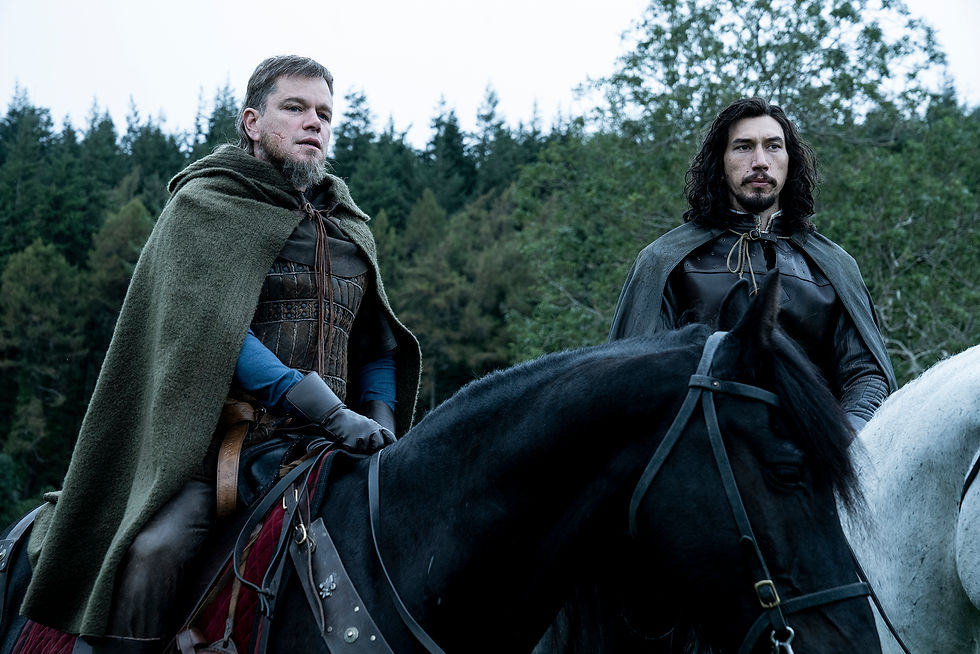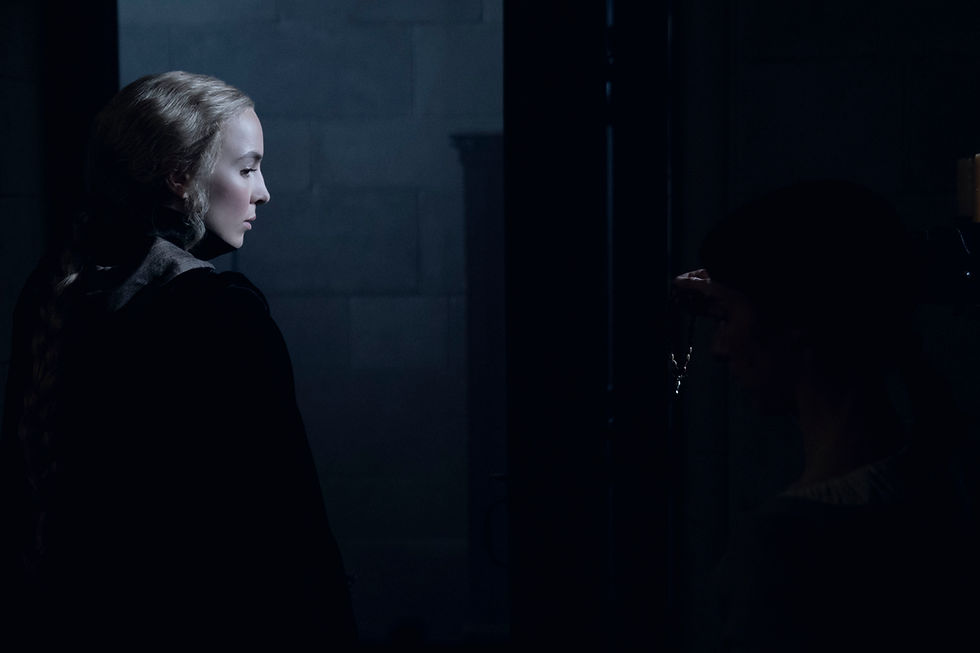Review: The Last Duel and the future of medieval dramas
- EPOCH

- Feb 28, 2022
- 7 min read
Updated: May 27, 2022
Meredith Guthrie | Lancaster University
Meredith Guthrie assesses Ridley Scott's recent movie, ranking it as one of the best period films to date.
Medieval dramas often fail to deliver on big promises. The accusation could easily be levied at director Ridley Scott, whose credits include the lukewarm adaptation of Robin Hood (2010) and the epic, if dizzying, Kingdom of Heaven (2005). Scott is not known for great subtlety, and The Last Duel has all the hallmarks of his distinctive approach to historical drama: frenzied but well-paced scenes of violence, intensely atmospheric lighting, and a willingness to be flexible with historical reality for the sake of compelling storylines. Yet, unlike many of its counterparts in the wider cinematic canon, The Last Duel delivers in historic style.
The film recalls the events leading up to the last instance of judicial combat in French history, in which Jean de Carrouges (Matt Damon) challenges his rival, Jacques Le Gris (Adam Driver), after the latter is accused of rape by Carrouges' wife, Marguerite (Jodie Comer). The film opens in 1386 in Paris, with Carrouges and Le Gris preparing for the spectacle, which has captured the attention of peers and peasants alike who are amassing to witness the fierce exchange. Marguerite, dressed in black and perched atop a wooden platform overlooking a combat arena, waits silently and sombrely as her husband and his enemy enter the tiltyard to settle a long-standing score. The duel itself bookends the remainder of the film, which is subdivided into three acts that sketch out the relationships and interactions that brought about the film's titular event from the viewpoints of its main characters. Screenwriters Matt Damon and Ben Affleck (who also plays the absurdly libertine Count Pierre d'Alençon) wrote the first two vignettes for Jean de Carrouges and Jacques Le Gris, while Nicole Holofcener tackled Marguerite's narrative.

In the first two acts, the characters are contorted to suit the fictions of their respective protagonists. Jean de Carrouges imagines himself to be a resolute warrior for the king and a devoted husband. Le Gris, by contrast, sees himself as a singular courtesan with education and confidence, and these qualities have brought him into circles that have rewarded his womanising preoccupations. Once close companions, their paths splinter and fracture as Le Gris gains social and economic capital, often at Carrouges' expense. Over the course of their respective narratives, it becomes clear that any transgression committed against Margeurite will also carry the substantial weight of arrogance, wounded pride, and unbridled opportunism.
These first two segments set the stage for Marguerite's experience in the film's third act. Medieval sources more often accentuate the actions of men (in military service, litigation, or in monetary exchanges, for example), so much of Margeurite's story is the work of Holofcener and Comer. Together they bring forward an observant, intelligent, and formidable character. These qualities are most evidently on display when she is brought before the parlement (a medieval appellate court) and the king, Charles VI, to be interrogated over her accusation. The full weight of her testimony is then revealed. The judicial duel— meant to vindicate her allegations and orchestrated by her husband's vengeful hand— would carry the authority of God's divine judgement. Should Carrouges fail, it would be viewed as proof of her perjury, and Margeurite would burn as a false accuser.
This tripartite structure of differing perspectives underscores the difficult intersections of truth, identity, justice, and honour that is the essence of the film's more understated narrative momentum. The Last Duel isn't about the final altercation, and it isn't even about sexual violence. Those are the motifs used to illustrate how ego, reinforced by complacent social mores, forges victims out of bystanders. The film reinforces this at every turn by keeping Margeurite in the periphery. She is brought into focus only on strategically rare occasions, even in her own retelling. This is partly what makes the film so profoundly unsettling and exhausting to watch, and it is also perhaps why the film has not been entirely well-received. This isn't the story you want to be told.
If a bright spot is to be seen against such a bleak backdrop, it is watching the cast navigate the challenges of reincarnating their roles. Matt Damon, Adam Driver, and Ben Affleck take full advantage of the liberty such a format offers. There are moments when the dialogue is so exaggerated it borders on the absurd, but it works well in the context of the film's competing perspectives. Yet for every blunt melodramatic exchange, there are a dozen subtler details to reward an attentive audience. Jodie Comer and Harriet Walker (who plays Carrouges' stoic mother) deserve particular praise for embodying the range of female expectations and experiences the film demands.

Critics have been quick to compare it to the 1950 film Rashomon, which tackled a similar narrative across multiple perspectives. While perhaps a fair point, the comparison risks consigning The Last Duel to something unremarkable. What The Last Duel brings to the cinematic table has as much to do with its position in the genre as it does with content. Medieval dramas are nearly always designed foremost to entertain, often relying on aesthetics when the substance proves elusive. That's not a justification for the potentially thorny questions that accompany a passive gaze. It is, however, the commercial reality of a genre in which historical accuracy is generally offered up as the sacrifice for grit and gallantry. Medieval and medieval-inspired period pieces generally encourage audiences to revel in the space between what is familiar, what is foreign, and what is fantasy. By contrast, this film will not permit you to retreat into the fanciful spaces of your imagination; it will make you uncomfortable for a host of reasons. This is the film's greatest strength. The Last Duel doesn't dress up twentieth-century sensibilities in a cheap suit of armour. Rather, the filmmakers managed to find the right episode in medieval history to illustrate a regrettably timeless reality.
There is the issue of historical accuracy, and this is too often where historians can't escape the responsibilities of their discipline. Surprisingly, the film doesn't make extraordinary efforts to acquaint the audience with the nuances of fourteenth-century life. Virtually all the historical context concerning the economics of military service, land transference, the mechanisms of justice, education and literacy, court culture, and the role of women in society is presented to the audience to reinforce ideas of masculinity or misogyny. By contrast, other aspects of the film's historical setting are left entirely unexplained. As an example, the source of Charles VI's visibly aloof and eccentric behaviour is never illuminated (his first serious episodes of psychosis and debilitating mental illness that marked the rest of his reign were a few short years away). For a casual viewer, this won't make any difference. For the chronically curious, however, it offers a lot of avenues to explore the period in more depth.

Of course, many scenes have been fictionalised for the purposes of a coherent narrative, but it is remarkable what the film extracts directly from historical sources. Credit must go to Eric Jager, the author of The Last Duel: A True Story of Crime, Scandal, and Trial by Combat in Medieval France (2004), the nonfiction book that explores this episode in French history, and a consultant for the film. Jager, a professor of medieval literature at UCLA, draws from legal records that illuminate the court proceedings that supplement the chroniclers' accounts. Medieval experts may bristle at how the film adopts much of its plotline in accordance with the chronicler Jean Froissart, who was not present at the duel. Froissart expounded—and potentially embellished—the duel in greater detail. Margeurite's sentencing and presence at the arena, for example, are only in Froissart's retelling. Froissart also set the duel in Paris, while the monk of St Denis, a more likely eyewitness, correctly placed the duel just outside the city at St Martin-des-Champs. The contemporary sources are also far more sceptical of Jean Le Gris' guilt, but the filmmakers (wisely) did not make this an ambiguous point. Since the contemporary records are not consistent, the question of historical accuracy can be difficult to assess, but the film certainly has historical integrity.

There are ample recent examples of medieval dramas that have completely neglected elementary historical facts to meet the audience's expectations, often with some of the era's most notable and well-documented figures. Yet The Last Duel reflects an awareness of the written record of the period, and the additions and adaptations point to defined creative aims that are not meant to subvert historical understanding. That's worth something. A 2019 survey by the American Historical Association noted that the public is far more apt to learn history from resources that could be consumed passively, and fictional TV and film ranked second behind documentaries. Audiences want more, and they want to be told the truth (where the truth can be told). Filmmakers and historians should continue trying to bridge the gap between education and entertainment and make transparency part of the experience for curious viewers. There is a lot of opportunity to make good on those promises that have— more often than not— been left broken. In this sense, The Last Duel serves as a worthy example for others to follow.
Further Reading and Viewing:
Chronique du Religieux de Saint-Denys, ed. M.L. Bellaguet, v. 1 (Paris: Crapelet, 1839)
Jean Froissart, Chronicles of England, France, Spain, and the Adjoining Countries, Vol 2, trans. Thomas Johnes (London: Henry G Bohn, 1857). See pp 203-205 for the full account.
Lindy Grant, Blanche of Castille, Queen of France (New Haven: Yale University Press, 2017)
Eric Jager, The Last Duel: A True Story of Crime, Scandal, and Trial by Combat in Medieval France (Arrow Books, 2006)
Christine de Pizan, The Book of the City of Ladies, trans. Rosalind Brown-Grant (Harmondsworth: Penguin Classics, 1999)
The Last Duel, dir. By Ridley Scott (20th Century Studios, 2021), online film recording, Disney +
Meredith Guthrie is a doctoral researcher at Lancaster University, researching the role of bishops in English government during the fourteenth century. She is supervised by Dr Sophie Ambler and Dr Alex Metcalfe.

